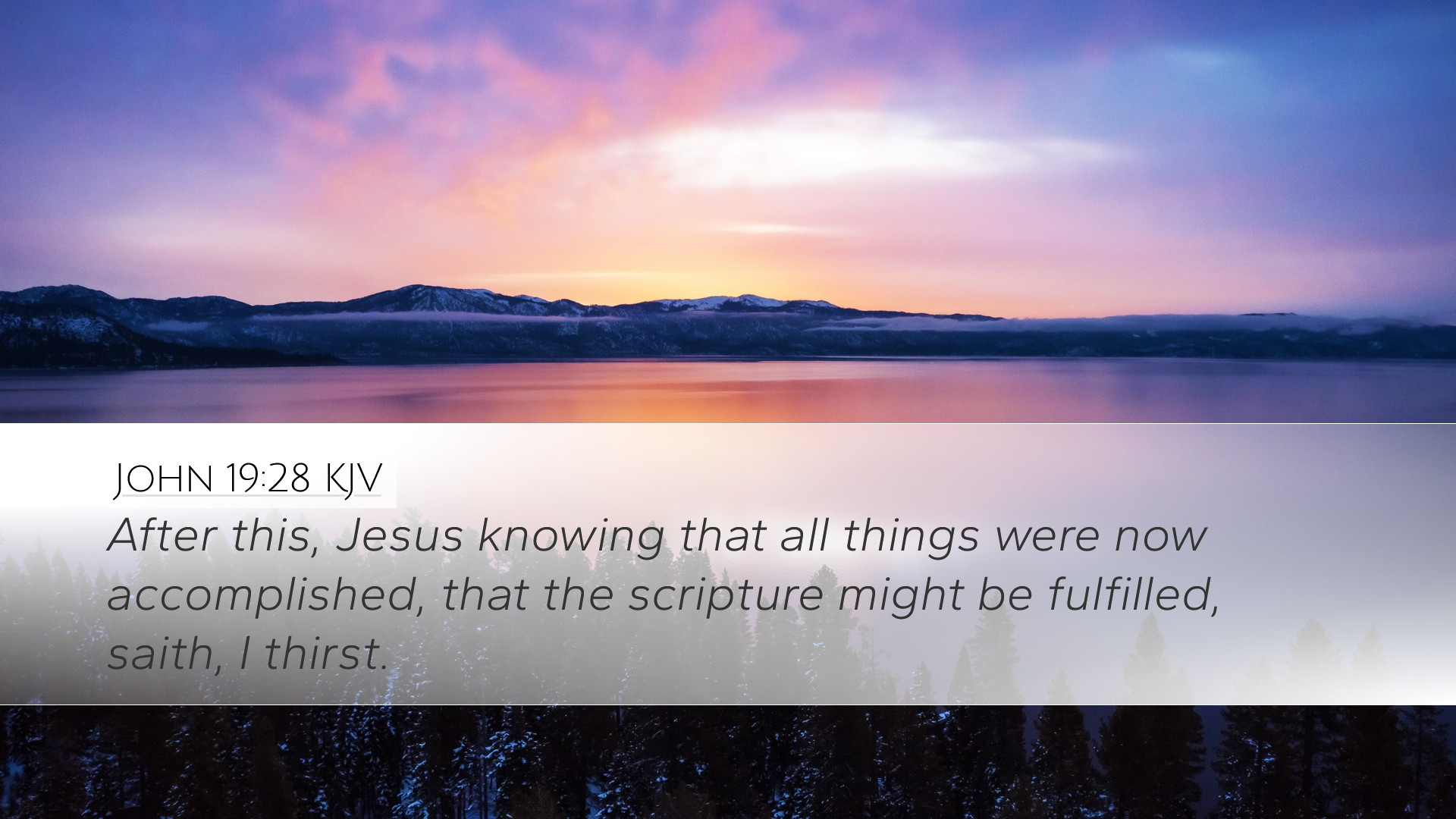Commentary on John 19:28
John 19:28 (KJV): "After this, Jesus knowing that all things were now accomplished, that the scripture might be fulfilled, saith, I thirst."
Introduction
This profound statement made by Jesus in the Gospel of John speaks volumes about His humanity, fulfillment of prophecy, and divine mission. The verse encapsulates the culmination of His sufferings and serves as a poignant reminder of His role as the Messiah. In this commentary, we will explore the insights provided by esteemed biblical scholars such as Matthew Henry, Albert Barnes, and Adam Clarke, weaving together their knowledge to illuminate the deep significance of this moment.
Contextual Background
The scene unfolds at Golgotha, the place of crucifixion. As Jesus hangs on the cross, He endures immense physical agony and spiritual abandonment. Understanding this context is crucial as it highlights His suffering and identifies with humanity’s plight. This deep suffering illustrates both the physical reality of crucifixion and the fulfillment of biblical prophecy.
Insights from Matthew Henry
Humanity of Christ: Matthew Henry emphasizes that Jesus, fully aware of His mission, expressed a very human need by declaring “I thirst.” This highlights the dual nature of Christ—fully God yet fully man. It reminds believers that He experienced genuine human emotions and physical sensations.
Fulfilling Prophecy: Henry points out that Jesus’ thirst was not mere coincidence; it was a fulfillment of Old Testament prophecy, particularly Psalm 69:21, which speaks of the Messiah being given vinegar to drink. Henry sees this as critical in establishing Jesus as the prophesied Savior, confirming that everything transpiring was under divine orchestration.
Insights from Albert Barnes
Knowledge of Accomplishment: Albert Barnes notes that Jesus’ awareness that “all things were now accomplished” conveys His understanding of the significance of His suffering and sacrifice. There is a theological depth here, revealing that Jesus knew the completion of His redemptive work was at hand.
Expression of Thirst: Barnes further elaborates that the statement “I thirst” signifies more than just a physical longing. It can also be interpreted spiritually—it represents the thirst for righteousness, for the fulfillment of God’s plan, and the deep yearning for the salvation of humanity, which Jesus was tirelessly working towards.
Insights from Adam Clarke
The Drink Offered: Adam Clarke delves into the cultural implications of thirst during crucifixion. He highlights that soldiers would often give vinegar mixed with gall to alleviate the crucified person's thirst. Clarke relates this to how it was a form of mockery, yet also a part of fulfilling scripture, showcasing both the cruelty and the fulfillment of God’s redemptive plan.
Significance for Believers: Clarke emphasizes this moment as a profound message for believers—the thirst expressed by Jesus is an embodiment of the deep spiritual thirst the world has for truth, love, and redemption. It invites believers to reflect on their own spiritual thirst and the fulfillment found in Christ.
Theological Reflections
This verse is not merely a narrative detail; it invites deep theological reflection on the person and work of Jesus Christ. The act of thirsting while on the cross represents a culmination of His earthly trials. It is a reminder that Jesus faced the same physical struggles that all humans encounter, and yet He overcame them in His divine mission.
Exegesis and Interpretation
The phrase “that the scripture might be fulfilled” points to a broader narrative of salvation history. It suggests that every action taken during the crucifixion aligns with the prophecies foretelling the coming of the Messiah (Isaiah 53 and Psalm 22). This adherence to scriptural prophecy reinforces the belief that Jesus is the awaited Savior, fulfilling God’s covenantal promises.
Practical Applications for Pastors and Theologians
- Affirmation of Faith: This passage serves as an affirmation of faith for believers—reminding them of the suffering Christ endured for their sake.
- Encouragement in Suffering: Pastors can use this verse to provide comfort to church members facing trials, emphasizing that Jesus understands their pain.
- Call to Discipleship: It invites believers to consider their spiritual thirst and the way they seek to quench it, pointing them toward Christ as the ultimate source of spiritual sustenance.
Conclusion
In summary, John 19:28 serves as a profound reminder of Jesus’ humanity and divinity. He bore witness to physical suffering while simultaneously fulfilling God’s divine prophecy. The insights from Matthew Henry, Albert Barnes, and Adam Clarke provide a rich tapestry of meaning that calls believers into a deeper relationship with Christ. As we reflect on His cry of “I thirst,” we are invited into a transformative understanding of both our own thirst for God and His unrelenting love that satisfies it.


